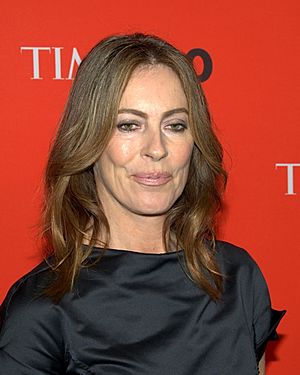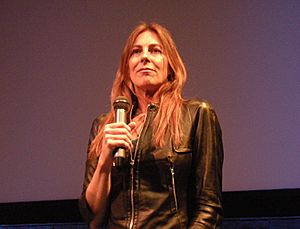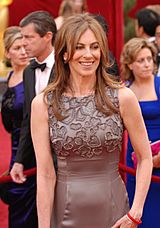Kathryn Bigelow facts for kids
Quick facts for kids
Kathryn Bigelow
|
|
|---|---|

Bigelow in 2010
|
|
| Born |
Kathryn Ann Bigelow
November 27, 1951 San Carlos, California, U.S.
|
| Education | San Francisco Art Institute (BFA) Columbia University (MFA) |
| Occupation |
|
| Years active | 1978–present |
| Spouse(s) | |
| Awards | Full list |
Kathryn Ann Bigelow (born November 27, 1951) is an American film director, producer, and screenwriter. She has won many important awards, including two Academy Awards (also known as Oscars), two BAFTA Awards, and a Primetime Emmy Award. In 2010, Time magazine recognized her as one of the 100 most influential people in the world.
Bigelow started her film directing career with The Loveless in 1981. She became well-known for directing exciting thrillers like Near Dark (1987), Blue Steel (1990), Point Break (1991), and Strange Days (1995). She also directed K-19: The Widowmaker in 2002.
In 2008, Bigelow directed the war drama The Hurt Locker. For this film, she made history by becoming the first woman to win the Academy Award for Best Director. After that, she directed the spy thriller Zero Dark Thirty (2012) and the crime drama Detroit (2017). She also directed episodes for the TV series Homicide: Life on the Street and won an Emmy for her work on the Netflix film Cartel Land (2015).
Contents
Early Life and School
Kathryn Bigelow was born in San Carlos, California. She was the only child of Gertrude Kathryn, a librarian, and Ronald Elliot Bigelow, a paint factory manager. Her mother's family came from Norway. Kathryn went to Sunny Hills High School in Fullerton, California.
When she was younger, Bigelow loved painting. She studied at the San Francisco Art Institute starting in 1970 and earned her degree in 1972. She also joined a special study program at the Whitney Museum of American Art in New York City. Later, she went to Columbia University for graduate film studies. There, she earned her master's degree. She also taught at the California Institute of the Arts.
Directing Movies
First Films and Breakthrough
Bigelow's first short film was The Set-Up (1978). It was about violence in movies. Her first full-length movie was The Loveless (1981), which she directed with Monty Montgomery. This film starred Willem Dafoe in one of his first big roles.
Next, she directed Near Dark (1987), a vampire film she co-wrote with Eric Red. This movie showed her interest in playing with different movie styles. She also directed a music video for the band New Order called "Touched by the Hand of God".
Her later films, Blue Steel, Point Break, and Strange Days, mixed her unique style with popular movie types. Blue Steel (1990) starred Jamie Lee Curtis as a new police officer. She is hunted by a dangerous killer.
Bigelow then directed the popular film Point Break (1991). It starred Keanu Reeves as an FBI agent who pretends to be a surfer. He tries to catch a group of bank robbers known as the "Ex-Presidents." They wore masks of former presidents during their robberies. Point Break was a big success at the box office.
In 1995, Bigelow directed Strange Days. Her ex-husband, James Cameron, wrote and produced it. Even with some good reviews, the film did not earn much money. She also directed three episodes of the TV series Homicide: Life on the Street in 1997 and 1998.
In 2000, she directed The Weight of Water. In 2002, she directed K-19: The Widowmaker, starring Harrison Ford and Liam Neeson. This movie was about a Soviet nuclear submarine.
Award-Winning Success
Bigelow's next film was The Hurt Locker (2008). It was shown at the Venice Film Festival in 2008 and released in the US in 2009. The movie is set in Iraq after the invasion. It received very high praise from critics. The film stars Jeremy Renner, Brian Geraghty, and Anthony Mackie.
For The Hurt Locker, Bigelow won the Directors Guild of America award. She was the first woman to win this award. She also won the award for Best Director at the 63rd British Academy Film Awards in 2010. The Hurt Locker also won Best Picture.
In 2010, Kathryn Bigelow became the first woman to win an Academy Award for Best Director for The Hurt Locker. She was only the fourth woman ever nominated for this honor. One of the other directors nominated that year was her ex-husband, James Cameron, for his film Avatar.
Bigelow's next film was Zero Dark Thirty (2012). This movie showed the American efforts to find Osama bin Laden. Film critics praised Zero Dark Thirty. Bigelow won the New York Film Critics Circle Award for Best Director for this film. She was the first woman to win this award twice. She had won it before for The Hurt Locker.
Bigelow worked with Mark Boal again on the film Detroit (2017). This movie is about the 1967 Detroit riots. It was released in July 2017, around the 50th anniversary of the riots. The film stars John Boyega, Hannah Murray, Will Poulter, and Anthony Mackie.
Bigelow was an executive producer for Triple Frontier (2019). She also directs commercials for companies like the Army National Guard and Apple. In May 2024, Netflix announced that Bigelow would direct a new movie for them. The film, called A House of Dynamite, is about White House officials dealing with a missile attack.
Film Style
Kathryn Bigelow's movies often explore how films can be very active and exciting. She sometimes uses special camera equipment to get moving shots. In many of her films, like The Hurt Locker, Point Break, and Strange Days, she used cameras that could be held by hand or moved around easily.
Her films often include intense action scenes. This has been a part of her work since the beginning. For her first short film, The Set-Up, she even asked the actors to really hit each other. Her first full-length movie, The Loveless, was about a motorcycle gang and the action that happens when they visit a small town.
Near Dark was a vampire movie that mixed the Western and horror genres. It became a very popular film among horror fans. Blue Steel was her first action film. It featured a female police officer as the main character. This was a new idea for action movies at the time.
Point Break was her most successful film at the time. It was the first time she used long, smooth camera shots. Although her next film, Strange Days, did not do well financially, Bigelow and her team spent a year creating a special camera for it. This camera was designed to see things almost like a human eye.
After some films that were not as successful, Bigelow made a big comeback with The Hurt Locker. This film was her first time making a movie that felt like a documentary. It followed a bomb squad in the Iraq War. Her next film, Zero Dark Thirty, continued this style. It looked closely at historical events and global politics.
Bigelow is known for going to great lengths for her films. For example, during the skydiving scene in Point Break, she was on the airplane with a parachute to film Patrick Swayze. For The Hurt Locker, she filmed in Jordan in very hot weather.
Other Work
In the early 1980s, Bigelow also modeled for a Gap advertisement. She acted in Lizzie Borden's 1983 film Born in Flames. She also appeared in the 1988 music video for Martini Ranch's "Reach," which was directed by James Cameron.
Personal Life
Kathryn Bigelow was married to director James Cameron from 1989 to 1991.
Filmography
Film
| Year | Title | ||||
|---|---|---|---|---|---|
| Director | Writer | Producer | Notes | ||
| 1981 | The Loveless | Yes | Yes | No | Co-written and co-directed with Monty Montgomery |
| 1987 | Near Dark | Yes | Yes | No | Co-written with Eric Red |
| 1990 | Blue Steel | Yes | Yes | No | |
| 1991 | Point Break | Yes | Uncredited | No | Co-written with W. Peter Iliff and James Cameron (uncredited) |
| 1995 | Strange Days | Yes | No | No | |
| 1996 | Undertow | No | Yes | No | Co-written with Eric Red |
| 2000 | The Weight of Water | Yes | No | No | |
| 2002 | K-19: The Widowmaker | Yes | No | Yes | |
| 2008 | The Hurt Locker | Yes | No | Yes | |
| 2012 | Zero Dark Thirty | Yes | No | Yes | |
| 2017 | Detroit | Yes | No | Yes | |
| 2025 | A House of Dynamite | Yes | No | Yes |
Executive producer
- Cartel Land (2015)
- Triple Frontier (2019)
Television
- Wild Palms: "Rising Sons" (1993)
- Homicide: Life on the Street: "Fallen Heroes" Parts 1 & 2 (1998)
- Homicide: Life on the Street: "Lines of Fire" (1999)
- Karen Sisco: "He Was a Friend of Mine" (2004)
Other Works
| Year | Title | Role | Notes |
|---|---|---|---|
| 1978 | The Set-Up | Director | Short film |
| 1983 | Born in Flames | Actress | Role: Kathy Larson |
| 1987 | "Touched by the Hand of God" – New Order | Director | Music video |
| 1988 | "Reach" – Martini Ranch | Actress | Music video |
| 1995 | "Selling Jesus" – Skunk Anansie | Director | Music video |
| 2014 | Last Days | Director | Short film / PSA |
Awards and Nominations
See also
 In Spanish: Kathryn Bigelow para niños
In Spanish: Kathryn Bigelow para niños
- List of Academy Award records
- List of female film and television directors
- List of accolades received by The Hurt Locker
- List of accolades received by Zero Dark Thirty
 | Ernest Everett Just |
 | Mary Jackson |
 | Emmett Chappelle |
 | Marie Maynard Daly |



